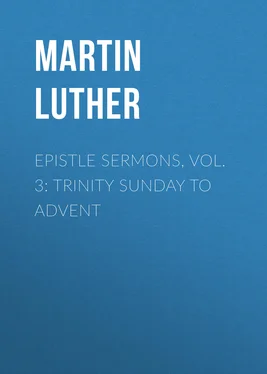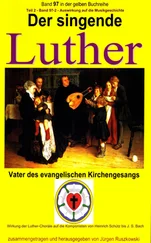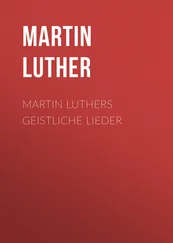Martin Luther - Epistle Sermons, Vol. 3 - Trinity Sunday to Advent
Здесь есть возможность читать онлайн «Martin Luther - Epistle Sermons, Vol. 3 - Trinity Sunday to Advent» — ознакомительный отрывок электронной книги совершенно бесплатно, а после прочтения отрывка купить полную версию. В некоторых случаях можно слушать аудио, скачать через торрент в формате fb2 и присутствует краткое содержание. Жанр: foreign_prose, foreign_religion, Философия, foreign_psychology, foreign_antique, на немецком языке. Описание произведения, (предисловие) а так же отзывы посетителей доступны на портале библиотеки ЛибКат.
- Название:Epistle Sermons, Vol. 3: Trinity Sunday to Advent
- Автор:
- Жанр:
- Год:неизвестен
- ISBN:нет данных
- Рейтинг книги:5 / 5. Голосов: 1
-
Избранное:Добавить в избранное
- Отзывы:
-
Ваша оценка:
- 100
- 1
- 2
- 3
- 4
- 5
Epistle Sermons, Vol. 3: Trinity Sunday to Advent: краткое содержание, описание и аннотация
Предлагаем к чтению аннотацию, описание, краткое содержание или предисловие (зависит от того, что написал сам автор книги «Epistle Sermons, Vol. 3: Trinity Sunday to Advent»). Если вы не нашли необходимую информацию о книге — напишите в комментариях, мы постараемся отыскать её.
Epistle Sermons, Vol. 3: Trinity Sunday to Advent — читать онлайн ознакомительный отрывок
Ниже представлен текст книги, разбитый по страницам. Система сохранения места последней прочитанной страницы, позволяет с удобством читать онлайн бесплатно книгу «Epistle Sermons, Vol. 3: Trinity Sunday to Advent», без необходимости каждый раз заново искать на чём Вы остановились. Поставьте закладку, и сможете в любой момент перейти на страницу, на которой закончили чтение.
Интервал:
Закладка:
PAUL AND MOSES AGREE IN TESTIMONY
7. Again, Paul makes mention of Christ in different phrase, saying: "Neither let us tempt Christ, as some of them also tempted, and were destroyed of serpents." 1 Cor 10, 9. Now, keeping this verse in mind, note how Paul and Moses kiss each other, how clearly the one responds to the other. For Moses says (Num 14, 22): "All those men … have tempted me these ten times, and have not hearkened to my voice," and in this connection the speaker is represented by the term "Lord," everywhere in the Bible printed by us in capitals to indicate a name belonging only to the Eternal, applicable to none but the one true God. Other terms used to designate God are sometimes applied also to men, but this word "Lord" refers only to God.
Now, Moses says: "And the Lord [Adonai, the true God] said … All these men … have tempted me these ten times." Then comes Paul explaining who this God is—saying they tempted "Christ." Crawl through this statement if you may; the fact remains that Paul declares it was Christ who was tempted, and Moses makes him the one eternal and true God. Moreover, Christ was not at that time born; no, nor were Mary and David. Nevertheless, the apostle plainly says, They tempted Christ, let us not also tempt him.
8. Certainly enough, then, Christ is the man to whom Moses refers as God. Thus the testimony of Moses long before is identical with that of Paul. Though employing different terms, they both confess Christ as the Son of God, born in eternity of the Father, in the same divine essence and yet distinct from him. You may call this difference what you will; we indicate it by the term "person." True, we do not make a wholly clear explanation of the mystery; we but stammer when speaking of a "Trinity." But what are we to do? we cannot better the attempt. So, then, the Father is not the Son, but the Son is born of the Father in eternity; and the Holy Spirit proceeds from God the Father and God the Son. Thus there are three persons, and yet but one God. For what Moses declares concerning God Paul says is spoken of Christ.
9. The same argument substantially Paul employs in Acts 20, 28, when, blessing the Church of Miletus and exhorting the assembled ministers concerning their office, he says: "Take heed unto yourselves, and to all the flock, in which the Holy Spirit hath made you bishops, to feed the church of the Lord which he purchased with his own blood." This, too, is a significant text, proving beyond all controversy that Christ our Lord, who purchased the Church with his blood, is truly God, and to him the Church belongs. For the apostle plainly asserts it was God who bought the Church with his blood and that the Church is his own.
Now, in view of the fact already established that the persons are distinct, and of the further statement that God has purchased the Church through his own blood, we inevitably conclude that Christ our Saviour is true God, born of the Father in eternity, and that he also became man and was born of the Virgin Mary in time.
10. If such blood—the material, tangible, crimson blood, shed by a real man—is truly to be called the blood of God, then he who shed it must be actually God, an eternal, almighty person in the one divine essence. In that case we truly can say the blood flowing from the side of the crucified One and spilled upon the ground is not merely the blood of an ordinary man, but God's own. Paul does not indulge in frivolous talk. He speaks of a most momentous matter; and he is in dead earnest when he in his exhortation reminds us that it is an exalted office to rule the Church and to feed it with the Word of God. Lest we toy in the performance of such an office we are reminded that the flock is as dear to him as the blood of his dear Son, so precious that all creatures combined can furnish no equivalent. And if we are indolent or unfaithful, we sin against the blood of God and become guilty of it, inasmuch as through our fault it has been shed in vain for the souls which we should oversee.
11. There are many passages of similar import, particularly in the Gospel of John. So we cannot evade the truth but must say God the Father, God the Son and God the Holy Spirit are three individual persons, yet of one divine essence. We do not, as the Jews and Turks derisively allege, worship three Gods; we worship only one God, represented to us in the Scriptures as three persons.
Christ said to Philip (Jn 14, 9), "He that hath seen me hath seen the Father." There Christ claims unity and equality with the Father in the one divine essence. So does Paul in Colossians 1, 15, where he calls Christ "the image of the invisible God," at the same time indicating two distinct persons: the Father is not the Son and the Son is not the Father, yet they are one God. Such passages, I say, are frequent. By means of them the sainted fathers valiantly maintained this dogma of the Trinity against the devil and the world, thus making it our heritage.
12. Now, what care we that reason should regard it as foolishness? It requires no skill to cavil over these things; I could do that as well as others. But, praise God, I have the grace to desire no controversy on this point. When I know it is the Word of God that declares the Trinity, that God has said so, I do not inquire how it can be true; I am content with the simple Word of God, let it harmonize with reason as it may. And every Christian should adopt the same course with respect to all the articles of our faith. Let there be no caviling and contention on the score of possibility; be satisfied with the inquiry: Is it the Word of God? If a thing be his Word, if he has spoken it, you may confidently rely upon it he will not lie nor deceive you, though you may not understand the how and the when.
Since, then, this article of the Holy Trinity is certified by the Word of God, and the sainted fathers have from the inception of the Church chivalrously defended and maintained the article against every sect, we are not to dispute as to how God the Father, the Son and the Holy Spirit are one God. This is an incomprehensible mystery. It is enough that God in his Word gives such testimony of himself. Both his nature and its revelation to us are far beyond our understanding.
PHYSICAL LIFE INEXPLICABLE TO REASON
13. And why should you presume to comprehend, to exactly understand, the sublime, inconceivable divine essence when you are wholly ignorant of your own body and life? You cannot explain the action of your laughter, nor how your eyes give you knowledge of a castle or mountain ten miles away. You cannot tell how in sleep one, dead to the external world, is yet alive. If we are unable to understand the least detail of our physical selves, anything so insignificant as the growth of a mere hair, for instance, can we, unaided by the revelation of God's Word, climb by reason—that reason so blind to things within its natural realm—into the realm of heavenly mysteries and comprehend and define God in his majesty?
If you employ reason from mere love of disputation, why not devote it to questions concerning the daily workings of your physical nature? for instance, where are the five senses during sleep? just how is the sound of your own laughter produced? We might without sin occupy ourselves with such questions. But as to the absolute truth in a matter such as this, let us abide patiently by the authority of the Word. The Word says that Christ is the express image of the invisible God, the firstborn of all creatures; in other words, he is God equally with the Father.
14. Again, John 5, 23 testifies that all should honor the Son as they honor the Father. And in John 12, 44 we read: "He that believeth on me, believeth not on me, but on him that sent me." Also, John 14, 1: "Believe in God, believe also in me." And again, John 16, 15: "All things whatsoever the Father hath are mine." These and similar passages are armor that cannot be pierced: for they are uttered by God, who does not lie and who alone is qualified to speak the truth concerning himself. Thus the dogma of the Trinity is thoroughly founded upon the holy Scriptures.
Читать дальшеИнтервал:
Закладка:
Похожие книги на «Epistle Sermons, Vol. 3: Trinity Sunday to Advent»
Представляем Вашему вниманию похожие книги на «Epistle Sermons, Vol. 3: Trinity Sunday to Advent» списком для выбора. Мы отобрали схожую по названию и смыслу литературу в надежде предоставить читателям больше вариантов отыскать новые, интересные, ещё непрочитанные произведения.
Обсуждение, отзывы о книге «Epistle Sermons, Vol. 3: Trinity Sunday to Advent» и просто собственные мнения читателей. Оставьте ваши комментарии, напишите, что Вы думаете о произведении, его смысле или главных героях. Укажите что конкретно понравилось, а что нет, и почему Вы так считаете.












